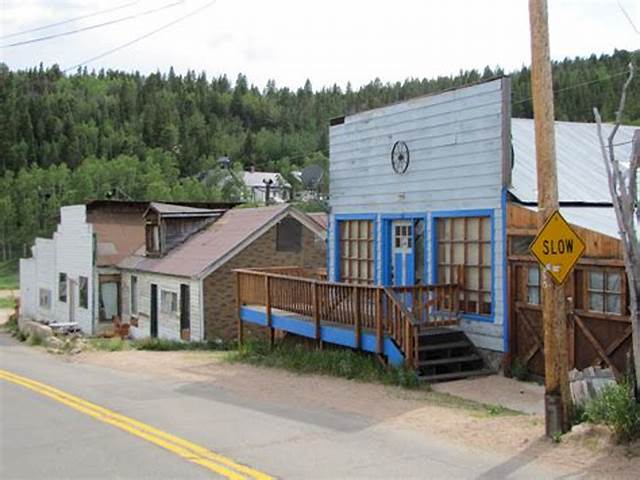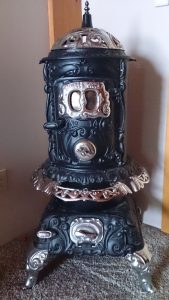
Ward Community Center
As the 1960s sunk into the next decade, I decided to leave San Francisco, to “get my head together.” A friend knew I had carpentry skills and suggested I contact a woman who owned property in the Colorado Rockies above Boulder. She needed a handyman. A cabin was available. That seemed attractive. To get away from the protests and the war, live the simple life, and work with my hands.
I wrote to my friend’s contact and received a shaky-handed but ladylike postcard from Hazel Schmoll, the property owner in Colorado.
So, we headed for Ward, Colorado, a town that had been built around the mines that dotted the Colorado canyon landscape. Rusting headframes and pyramid-shaped mine dumps flowed down the hills from the old mines.
When we arrived, we found a semi-habitable cabin in a lovely location with a wood stove in the kitchen, an ancient coal stove in a second room, no running water, and no electricity. Welcome to country livin’.
I met with Hazel, a delicate but lively lady who had been the Colorado State Botanist for several decades. She was a crafty woman who looked at me knowingly through rheumy eyes. After a sweet conversation over iced tea, she had ascertained that I would suffice as a carpenter for the many tasks that awaited me at her “summer places.”
She owned a large hostel, a former resort, up in the national forest. In town, she owned several cabins refurbished with 1920s plumbing, and what she called her “commercial property” on Main Street. She wanted me to spruce up the aging storefront to make it attractive to potential businesses that might want to land in the abandoned mining town.
I walked through the place. It was a wreck. Decades of heavy snows and wind had gradually pushed the old structure into a downhill-canted parallelogram. The foundation consisted of assorted mine timbers, pine logs, and rusty steel stanchions cadged from abandoned mine tunnels.
I returned to break the news to Hazel, that her “commercial property” was both unusable and a wreck. She took my report pleasantly, folded her hands in her lap and said simply, “so we shall begin anew.” And that was how my first venture into house building began.
With the aid of new friend, Douglas, a personable peer who had escaped to the sleepy mountain town with his young wife and baby, I began anew by tearing the old building down. Much of the wood was useable, so we stored it across Main Street in an old union meeting hall that creaked in the breeze like an ancient sailing vessel.
First, we poured a concrete slab for the new building’s floor. We hoped to keep the basement open at one end to allow townsfolk, largely pickup-driving refugees from modern life’s rat races, shady pasts, and the war in Vietnam.
 Next, we laid cinder block basement walls, including the installation of a behemoth cast iron stove elegantly labeled as a “Chicago Hot Blast.” We framed upwards, using the old material whenever possible until we had recreated Hazel’s commercial property with two large display windows facing Main Street, a spacious front porch to encourage loitering, and a western-style false front.
Next, we laid cinder block basement walls, including the installation of a behemoth cast iron stove elegantly labeled as a “Chicago Hot Blast.” We framed upwards, using the old material whenever possible until we had recreated Hazel’s commercial property with two large display windows facing Main Street, a spacious front porch to encourage loitering, and a western-style false front.
By early autumn, the aspens had turned yellow, the building was completed, and we celebrated with the townsfolk, gathering around huge pots of venison chili, spaghetti and meatballs, chips, salads, and plenty of beer. We danced into the night, sharing visions of how we could do Hazel right by converting Hazel’s commercial property into Ward’s own community center.
*
“Charlie!” The night air was cold and still. My girlfriend stood at the window in her nightgown. “Get up!”
Tongues of red and orange light flickered on the bedroom wall. Zoom barked at the kitchen door. The sound was explosive. I jumped out of bed, cold air shrinking my skin.
“Something’s burning,” she said. “Look.” She made room for me at the window.
The sky was lit with cinders; they glowed as they slid up a tower of angry smoke. A pickup truck whined past.
“That’s the center of town,” I said, stumbling into my trousers. “My socks,” I cursed, my hands shaking. “Where are my socks!” I scuffled into the street, boots unlaced, our dog Zoom racing up the road ahead of me.
A neighbor pulled up in his truck and I jumped on the running board, my hands freezing in the wind. We roared up Left Hand Canyon Road and rounded the bend.
Flame belched out of every window in Hazel’s brand-new, recycled storefront. Flowers of fire blossomed around the chimney and flew into the sky, reflected from every cabin window on the hillside.
Uphill, headlights gathered at the old barn where the Ward Volunteer Fire department housed the town firefighting equipment, an overloaded Ford pickup equipped with a 400-gallon tank of water.
The neighbor stopped in front of the burning building.
I jumped off.
“Stay here,” he hollered.
I stared at the flames.
“Don’t move,” he shouted. “You hear me? Don’t do anything stupid. We’ll be right back with the truck.” He powered up the road against the roar of the flames.
Shock ran through my body like electricity but there was nothing I could do. Mute, out of breath, I stood frozen to the ground, protecting my face with a forearm. The heat and angry motion of combustion pushed me back. I watched the rafters ignite while my face tightened with the heat and my ass froze in the cold night air.
The town truck pulled onto the scene, loaded with our motley crew of firefighters. Doug jumped from behind the wheel, grim in his long-johns and cowboy hat.
I glared at him. What kind of a fool wears a cowboy hat to a fire? My building was burning down.
I must be doing it wrong.
I turned superstitious.
I had transgressed against my real life, back in the city — the theater collective, my vow to stop the war. This conflagration was the payback. I caught myself and began to haul the canvas hose out of the truck.
Johnny Adair, our local deputy and fire chief showed up, furious, a parka covering his undershirt. “You see what we got here?” he shouted toothlessly in my face. “We got people running around with their dicks in their hands. Jesus Christ.”
There was no adapter for the hydrant. Amidst shouts and countermands, the volunteers scrambled to find the missing link while the front of Hazel’s community center ate itself for breakfast.
Another neighbor pulled the adapter out from under the passenger’s seat of the truck. With the hoses hooked up, we had water on the fire in minutes. The flames retreated, but not before Hazel’s structure had been badly torched into a cross-hatch tangle of wet, stinking, carbonized sticks.
I trudged downhill to my place. Wooly and Zoom sniffed at my trousers and looked up at me, curious.
“Yeah. That’s fire you smell.” I said and filled their pans with breakfast kibble. “Dad’s night out. The eve of destruction.”
*
Turns out one of our thicker townspeople had been working on his truck in the basement. He had stoked up the Chicago Hot Blast, did his truck repairs and drove off, leaving the Hot Blast roaring. The chimney caught the floor on fire, the floor caught the wall on fire, and away she went.
Well, we rebuilt that sonofabitch building and threw another opening night party. Hazel was back again, dancing delicately to the sounds of “Gimme Shelter,” by the Rolling Stones. And do you know? That building still stands, much the way we built it, back in the crazy days of 1970.
# # #
Writer, editor, and educator based in Los Angeles. He's also played a lot of music. Degelman teaches writing at California State University, Los Angeles.
Degelman lives in the hills of Hollywood with his companion on the road of life, four cats, assorted dogs, and a coterie of communard brothers and sisters.



Another great, vivid story, Charlie, full of memorable phrases and descriptions: “downhill-canted parallelogram” (I can see it perfectly), “cold air shrinking my skin”. The scenes come alive (and the picture of the Chicago Hot Blast is a beauty). As awful as the fire was, your scenes come alive for us. Thanks for sharing, and I’m glad you and Doug were not only able to rebuild, but your work still stands.
Thanks, Betsy! I’m glad you plowed through my fire story. It’s also odd to realize that something I built 50+ years ago, in another lifetime, is still standing and functional.
There’s a couple of other fire-fighting doozys from that time. Urban hippies had no idea how to keep wood- and coal-burning stoves safe, so we had plenty of cabin fires to practice dousing.
Also, we were the first long-haired, hippy, utopian anarchist volunteer fire department on the eastern slope of the Rockies at that time, we had some pretty fancy fed-funded fire fighting equipment for dealing with fires in our part of the Roosevelt National Forest. We were all long-haired and in good shape, so we could usually beat the other fire departments to the hot spots. Whew.
It’s also odd to realize that something I built 50+ years ago, in another lifetime, is still standing and functional.
This was a rollicking, unpredictable, and fortunately not quite out of control narrative. Really fun to read. Too bad that fire wasn’t as well controlled as your piece of writing.
P.S. For a guy who’s good with the words and the intellectual and theatrical stuff to also be able to tear down and then rebuild an actual building–that’s pretty awesome, and in my social circle, quite rare. Applause.
Thanks, Dale for your kind, thoughtful, and articulate comment. The real narrator stands in the reality of those times and yeah, my carpentry skills placed in my mind, heart, and hands by my old man.
Great story, Charlie. Your descriptive language makes iy easy to visualize the story. Glad you rebuilt it.
C, my dad was a fireman, but not once did he come home and reveal his battles. Reading this, I can imagine the stories he slept on, or only shared with my mom. We were there with you, celebrating with the townsfolk, eating spaghetti & drinking the beer. Only to wake up to that incredible nightmare of fire-spitting flames, sockless, helpless, as you watched in horror all your work destroyed. You even shared with us that one moment you experienced defeat. Love how quick you shook it off and continued the fight. That’s when I thought of my dad and the many fires he must have fought. Great piece of writing by a truly experienced lifer and a gifted wordsmith.
Patty! So sorry I missed this lovely comment when you wrote it. So interesting about your father. We had to keep a volunteer fire department going to fight forest fires in our district. It was very dramatic, sometimes terrifying, and the hardest physical labor I’ve ever done… and I’ve done a lot of that! Thanks! A great honor coming from you!
Thanx Chas for your wonderfully written tale of your trial by fire in a Colorado canyon and your hard-won redemption! Bravo Chas!